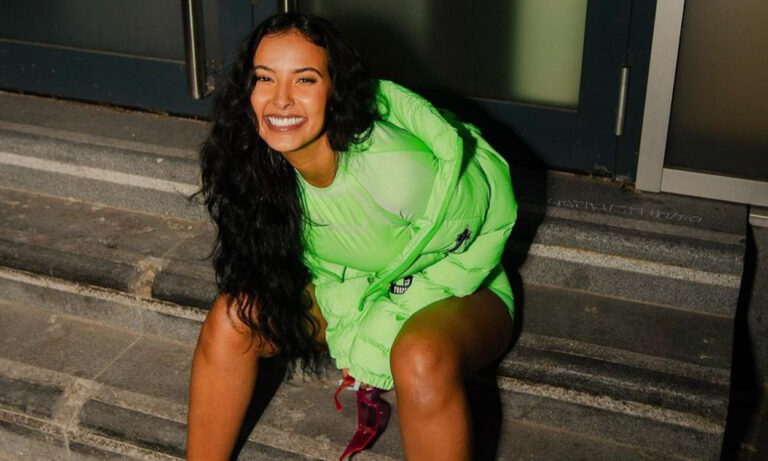Why new Love Island host Maya Jama is the most important voice for gen Z right now
From minuscule media gigs to hosting the coveted MOBO Awards, Maya Jama has established herself as the kingpin of British TV presenting. Having dutifully made her way up the ladder, Jama has now managed to secure one of the most prestigious media jobs in the UK—hosting Love Island. A firm favourite among gen Zers, the addictively juicy reality TV show is finally returning to our screens with the first episode of its winter edition due to take place on 16 January 2023. Considering this will be Jama’s first season, we thought it’d be apt to take a trip down memory lane and revisit some of the presenter’s most impressive career wins.
The people’s princess
Jama’s career trajectory is nothing less than astronomical. Her résumé boasts career milestones such as presenting gigs for Sky TV, Copa90 and the Brit Awards. Also included are a myriad of modelling jobs with titanic brands including Adidas and Maybelline, extensive reality TV credentials as well as a lengthy cluster of other in-person hosting positions. To sum it up, the girl’s been insanely busy for the past decade. Oh, and lest we forget her former status as BBC Radio 1’s go-to girl.
In a 2019 interview with Vogue, wherein the publication aptly deemed her the “poster girl” for a generation, the presenter noted: “The thing I get asked most is, ‘How are you so yourself? How do I get that confidence?’ I always respond, ‘Do whatever you would do if nobody was watching; don’t ever hold yourself back because of other people.’”
It’s true, Jama’s genuine charm and ability to draw you in has catapulted her to idol status—particularly among young Brits. She’s effortlessly charismatic, so much so that we can’t help but root for her. In 2020, alongside internet favourite Chunkz, Jama also made history by being the youngest woman to co-host the MOBO Awards—an annual event celebrating the best of black music. If anyone has proven their prowess for showmanship and adaptability, it’s her.
Tabloids have repeatedly minimised Jama’s accomplishments, comparing her achievements with that of white female presenters or fetishising her romantic relationships—anyone remember those four years when she was often solely referred to as “Stormzy’s girlfriend?” Nevertheless, the people’s princess has proven time and time again that she’s earned her place among the crème de la crème of the media elite.
Love Island 2023
With big reality TV power comes big responsibility. Love Island has faced a hefty amount of criticism over the years for its handling of candidates’ mental health post-show. Duty of care is still an issue within these kinds of highly emotionally charged environments—both on screen and off.
As reported by Vanity Fair, “there’s a difference between intellectually understanding something and experiencing it. And the kind of vulnerability that enables fame on Love Island—on almost any reality show—often leaves people radically ill-equipped to cope with it. There have been a handful of suicides within the casts of reality programs, from The Real Housewives of Beverly Hills to Storage Wars.”
However, these issues of mental health are in no way confined to contestants. In February 2020, former Love Island host Caroline Flack committed suicide after suffering extortionate online abuse and harassment. She became the third individual associated with the show to take their own life.
Now, in 2023, we’re all questioning the purpose of these programmes and whether they should be allowed to continue considering the complete destruction they often leave in their wake. At least some comfort can be taken in the new, recently announced duty of care protocols by ITV. Within these new parameters, participants will be asked to pause handles and accounts on their social media platforms for the duration of their time on the show—one of the many measures that ITV hopes will help to reduce strain on the cast’s mental health.
Additionally, ahead of entering the villa, Islanders will also receive guidance and training around mutually respectful behaviour in relationships. Participants on the show will also continue to be offered video training and guidance covering inclusive language around disability, sexuality, race and ethnicity, and microaggressions. These measures are invaluable, however, they don’t rectify or inherently change the often unstoppable toxic aspects of the show’s format.
Following the announcement that Jama would be heading up this year’s winter and summer seasons, gen Zers took to TikTok to show their feral excitement and enthusiasm for the presenter, making it insanely clear that they approved of the appointment.
@ ♬ -
One of the reasons viewers may’ve been so excited for Jama to come on board is due to the inexplicable issue fans had with the previous host, Laura Whitmore who took over after Flack’s death. Unsurprisingly, people were so unimpressed with Whitmore’s hosting style they even created a Reddit thread dedicated to slating the presenter.
The general consensus seemed to be that they deemed Whitmore as “dull,” “wooden,” and “boring.” While even I can admit she didn’t particularly jump off the screen, the sheer amount of criticism she received spoke more to misogyny than it did media training.
While it’s exciting to see someone as loved as Jama take on the Love Island mantle, it’s also important to recognise the fact that there’s every chance she might still face a barrage of backlash—no matter how hard ITV tries and rebrands.






